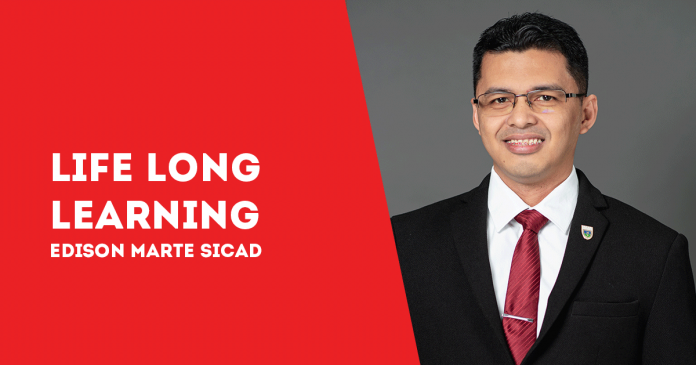
BY EDISON MARTE SICAD
“Go placidly amid the noise and haste, and remember what peace there may be in silence.” –Desiderata
A WORKPLACE, especially a government office where people come and go, can get spontaneously hectic despite the routine procedures. For a person may go from one office to another to process a transaction and, along the way, overlook some requirements or misconstrue an instruction. The employee may get irritated, and the “visitor” may become exasperated. But to serve the public, when taken into heart, is altruism personified.
On my part, transferring from a private to a public institution has been topsy-turvy from the get-go. Since I got used for more than a decade working in a private school, the transition to working in the government has been a culture shock.
The learning curve in my present work can go haywire. Sometimes, it’s “chaos in order” of sort. There is a sense of urgency embedded in some tasks that I must find out on my own. And when push comes to shove, I would get immobilize and find myself stuck in the starting line. And all I can do at that moment is to learn by observation and ask a lot of questions.
I admire the decisiveness of my colleagues. When a problem arises, they discuss it openly, own the accountability as a team, and solve the problem constructively. Although the hierarchy of roles is a given office-structure, and there are differences in responsibilities, all are equal when it comes to giving an opinion.
My colleagues respect and support each other. Food, laughter, and self-deprecating humor would enliven the workplace. Professional correction rules the day. We all want to see each other succeed. We all want to make each other fulfilled in our work and happy in our personal and family life. This I have witnessed and become part of for the past six months.
But there were days that I found myself lost. The daily grind would take its toll and scatter my perspective. Finding myself — picking up the pieces — becomes a daunting task. Experience could be the worst — and the best — teacher. Work-learning is not entirely a bookish problem-solving challenge. Reality can dampen my expectations. As the saying goes, “From failure to failure without losing enthusiasm.” — a lifelong learning advice that I cannot fully comprehend.
Whenever I find myself in a predicament, I am reminded by the CORE Values I learned from teaching in PAREF-Westbridge School: the values of Competence, Service, and Integrity (CSI). Also, I am guided by the teaching of Saint Josemaria Escrivá: to sanctify one’s work.
Competence is not just about knowing the right answer or knowing how to get the right answer. It’s not just about preparing ahead of time or finding means to rectify a mistake. It is also about building a good character: to be not only informative but also transformative. In court, “praying” for justice necessitates patience in getting an answer. The answer may not even materialize the way the aggrieved party wanted it to be. There are just so many factors involved that can affect the judgment of the court. Such situations continue to test my resolve.
The line “I have served. I will be of service.” as popularized in an action movie, is a good office-mantra. But in the workplace, my idiosyncrasies — and bad habits — would sometimes creep in. I get disappointed with myself when this would happen.
This is where sanctification comes into the picture. Such a perspective puts me back to the right track. The burden becomes a blessing in disguise, an integral part of professional growth. Fundamentally, to sanctify one’s work has nothing to do with ambition or promotion. It is the recognition — and even the appreciation — of the eternal significance of a temporal act. That in doing one’s work, a person is not only serving the people, but also serving God.
To some of us, the motivation for work is to support our family’s needs. Others would be aiming for a personal ambition or in building social prestige. All in all, we work to fulfill our dreams or achieve our lifegoals. In another way, public service may be stained by personal ulterior motives. To remain steadfast for the good of the people is my constant challenge.
Lastly, we can also work with — and for — integrity. In PAREF schools, the aim is for students to become Men and Women of Integrity: for students to use their knowledge in serving others without taking for granted their Christian values or relegating their spiritual obligations and needs for worldly success. In other words, to develop work habits driven by ethics and not by politics.
To sanctify my work — to live with integrity — has been my guidepost and the CORE values my compass as I begin my journey as a public servant.
I am sharing these thoughts to you, my dear reader, not as an analysis to a problem or a critique to a certain issue (far from it); but as an invitation for a reflection: a motivation that is more on “being” than in “having.”/PN



